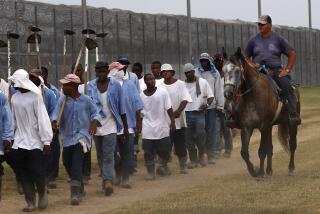Black Nationalists’ Spirit Survived Harsh S. Africa Prisons
- Share via
SOWETO, South Africa — In the early years, the white prison guards put Nelson R. Mandela, Walter Sisulu and the other South African black nationalists to work in a limestone quarry on Robben Island, denying them socks and long pants even on winter days and giving them only cold seawater for bathing.
The guards tried to break the inmates’ spirit by telling them they would soon be forgotten men.
A quarter of a century later, Sisulu remembered those threats Wednesday while sitting in a Soweto church. As he spoke, the sound of students singing freedom songs in his honor wafted in through an open window, offering proof that the prison guards had been wrong. Black South Africans did not forget their nationalist heroes.
The students were hoping for a glimpse of Sisulu, who had been released three days earlier with six other leaders of the outlawed African National Congress, the primary guerrilla group fighting minority white rule.
Sisulu and Ahmed Kathrada, in an interview with U.S. reporters Wednesday, said the early years in prison were the most difficult. For 12 years, they toiled in the quarry with picks and shovels, and visitors were rare. They were denied newspapers for 17 years and television for 24 years, until 1986.
“Prison was a shock to my system,” Sisulu, 77, said. “The shouting and the indignities heaped on (us) in those first few days are never forgotten.”
Mandela and other political prisoners carried out hunger strikes to protest prison conditions, and the government often retaliated.
One particularly brutal incident “was embedded in our memory,” said Kathrada, 60. On a winter night in 1971, a group of white guards, many of them drunk, rounded up Mandela, Sisulu, Kathrada and other hunger strikers.
“They stripped us all naked, made us face the wall with our hands against it and carried out what they said was a search,” Kathrada recalled. “Our comrade Govan Mbeki (released in 1986) almost had a heart attack. It was just a way of humiliating and punishing us. It did not end the hunger strike, though.”
Prison conditions began to improve in the 1970s and 1980s after appeals by the Red Cross and Helen Suzman, then the lone liberal member of the white Parliament. But that only confirmed the inmates’ belief that change in South Africa--whether in prison or outside--comes only with pressure, such as sanctions or international condemnation.
“The South African authorities do not undergo changes of heart because they have suddenly become kindly men,” Kathrada said. “Everything they have done, every concession they have made, is under pressure of one sort or another.”
More to Read
Sign up for Essential California
The most important California stories and recommendations in your inbox every morning.
You may occasionally receive promotional content from the Los Angeles Times.














